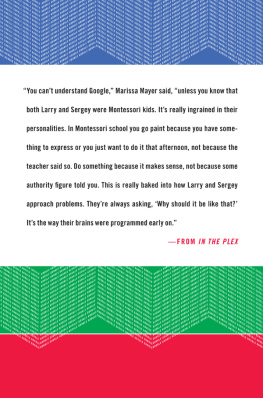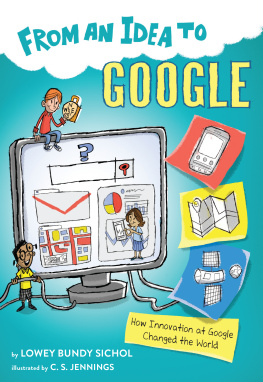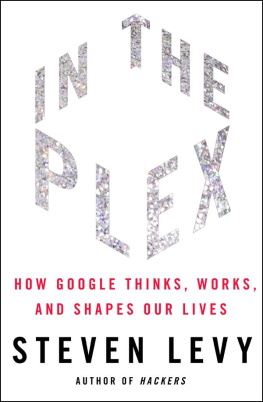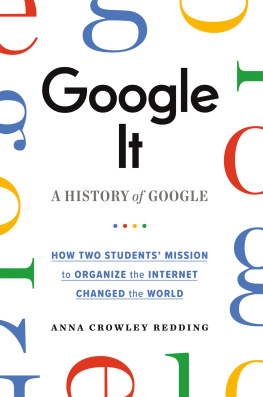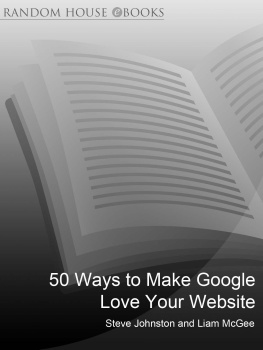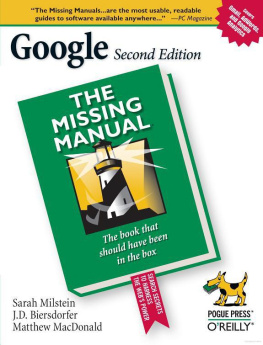ACKNOWLEDGMENTS
Google is known for its willingness to take risks. But it took an uncharacteristic and brave one in allowing a journalist to spend hundreds of hours with its employees, look over engineers shoulders as they developed products, and sit in on TGIFs, GPSs, and other councils and confabs. I dont know how deep a breath Eric Schmidt, Larry Page, and Sergey Brin took before approving the project, but Elliot Schrage, then the head of Googles global policy, clearly exhaled a sigh of relief at the sign-off, as did his colleagues David Krane, Gabriel Stricker, and Karen Wickre. All were champions of the scheme I presented to them.
The Googlers themselves could not have been more generous with their time and assistance. Though the list could literally go into the hundreds, I will dare to single out a few who took extraordinary pains to help me understand Google: Paul Buchheit, Matt Cutts, David Drummond, Urs Hlzle, Bradley Horowitz, Kai-Fu Lee, Salar Kamangar, Joe Kraus, Andrew McLaughlin, Marissa Mayer, Sundar Pichai, Andy Rubin, Amit Singhal, Hal Varian, and Susan Wojcicki. (Apologies in advance to others worthy of explicit mention.) I also benefited from the friendship and insights from my shadow network of compatriots from the APM trip that inspired the book. (On a foray to Baghdad, I forged similar bonds with Kannan Pashupathy and Hunter Walk.)
Googles communications team grasped what I was trying to do and worked hard to make sure I had the access and information to do it. Krane and Stricker (and later, Jill Hazelbaker and Rachel Whetstone) were especially helpful in strategizing ways to get onto various schedules, particularly the founders. Megan Quinn was a tolerant minder on the APM trip and a good friend thereafter. John Pinette orchestrated a very deep dive into Google China. Diana Adair and Nate Tyler took on the challenge of helping me peer inside the respective black boxes (though they both hate that term) of ads and search.
A very special thanks goes to Karen Wickre, my designated PR shepherd and the best guide to Google that anyone could imagine. She masterfully threaded a difficult needle as a consistent advocate for my project and a loyal representative of her employer. And she was wonderful company throughout.
My editors at Wired understood how the book project of their new employee would be not a distraction but a benefit to the magazine. So thanks to Chris Anderson, Bob Cohn, Thomas Goetz, Mark Horowitz, Jason Tanz, and Mark McCluskey. I am also grateful to my previous employer Newsweek and my editors there (particularly Mark Whitaker, George Hackett, and David Jefferson) for providing me with a platform to research Googles early days in real time. I also appreciate Kathy Devenys sign-off on the expense statement for the APM trip.
A virtual participant in all the interviews was my master transcriber Victoria Wright, who must now be the most knowledgeable person about Google who never set foot on the campus. During the spring of 2009 I had research assistance from Andrew Marantz, under the auspices of New York Universitys Literary Reporting mentorship program. Zach Gottlieb helped with research on Google.org. My friend Lynnea Johnson proved a lifesaver when she offered the Palo Alto cottage she co-owns with Carolyn Rose as my base camp for the project. The actual writing of the book accelerated because of a fantastic uncluttering of my office by Erin Rooney Doland. My fact-checking team included Deborah Branscum, Victoria Wright, Stacy Horn, Teresa Carpenter, and Andrew Levy. (Though, as always, the buck stops with the author.) I got wisdom and advice along the way from John Markoff, Kevin Kelly, and Brad Stone. My first and most enthusiastic reader, of course, was my wife, Teresa Carpenter. (Having a Pulitzer Prize winner in the house is pretty useful.)
As always, my agent Flip Brophy was invaluable at every stage of the perilous publishing process. At Simon & Schuster, Bob Bender was again my sharp-eyed editor, with Johanna Li assisting. The meticulous copyeditor at Simon & Schuster was Nancy Inglis. David Rosenthal believed from the beginning.
Every author relies most of all on the sacrifices and support of loved ones, and Im no exception. My deepest love and gratitude to Teresa and Andrew.
Finally, this bookas with almost every piece of nonfiction journalism written in the twenty-first centurywould have been immeasurably more difficult to produce without the Google search engine. Thanks to Larry, Sergey, and all of the engineers who produced and improved this technological and cultural marvel.

ALSO BY STEVEN LEVY
The Perfect Thing: How the iPod Shuffles Commerce, Culture, and Coolness
Crypto: How the Code Rebels Beat the Government
Saving Privacy in the Digital Age
Insanely Great: The Life and Times of Macintosh,
the Computer That Changed Everything
Artificial Life: The Quest for a New Creation
The Unicorns Secret: Murder in the Age of Aquarius
Hackers: Heroes of the Computer Revolution

Simon & Schuster
1230 Avenue of the Americas
New York, NY 10020
www.SimonandSchuster.com
Copyright 2011 by Steven Levy
All rights reserved, including the right to reproduce this book or portions thereof in any form whatsoever. For information address Simon & Schuster Subsidiary Rights Department, 1230 Avenue of the Americas, New York, NY 10020
First Simon & Schuster hardcover edition April 2011
SIMON & SCHUSTER and colophon are registered trademarks of Simon & Schuster, Inc.
The Simon & Schuster Speakers Bureau can bring authors to your live event.
For more information or to book an event contact the Simon & Schuster Speakers
Bureau at 1-866-248-3049 or visit our website at www.simonspeakers.com.
Designed by Ruth Lee Mui
Manufactured in the United States of America
10 9 8 7 6 5 4 3 2 1
Library of Congress Cataloging-in-Publication Data
Levy, Steven.
In the plex : how Google thinks, works, and shapes our lives / Steven Levy.
1st Simon & Schuster hbk. ed.
p. cm.
Includes bibliographical references and index.
1. Google (Firm). 2. Google. 3. Internet industryUnited States. I. Title.
HD9696.8.U64G6657 2011
338.7'6102504dc22 2010049964
ISBN 978-1-4165-9658-5
ISBN 978-1-4165-9671-4 (ebook)
Contents
In memory of Philip Klass (19202010)
PROLOGUE
SEARCHING FOR GOOGLE
It was a blazing hot July day in 2007, in the rural Indian village of Ragihalli, located thirty miles outside Bangalore. Twenty-two people from a company based in Mountain View, California, had driven in SUVs and vans up an unpaved road to this enclave of seventy threadbare huts with cement floors, surrounded by fields occasionally trampled by unwelcome elephants. Though electricity had come to Ragihalli some years earlier, there was not a single personal computer in the community. The visit had begun awkwardly, as the outsiders piled out of the cars and faced the entire population of the village, about two hundred people, who had turned out to welcome them. It was as if these well-dressed Westerners had dropped in from another planet, which in a sense they had. Young schoolchildren were pushed forward, and they performed a song. The visitors, in turn, gave the children notebooks and candy. There was an uncomfortable silence, broken when Marissa Mayer, the delegations leader, a woman of thirty-two, said, Lets interact with them. The group fanned out and began to engage the villagers in awkward conversation.

